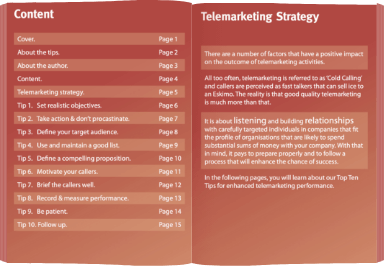Today I presented to the local IOD networking event in Hatfield on the subject of telemarketing and my brief 11 tips for success. It’s interesting that about half the room had tried using the phone themselves to try to generate new business. However, there was quite some concern over stalking. Many had been on the receiving end of bad experiences. One comments was ‘I always know when it’s a cold caller when the person at the other end of the line starts with Hi Michael, How are you?’
That struck me as interesting. We’ve all had that experience. It also demonstrates the speed with which recipients of calls make judgments and the importance of getting the message right. It also strongly suggests that pitch and tone are vital at the start of every call as it sets the pattern for the dialogue.
It’s really vital to plan calls. Why should the gatekeeper put you through? What will you say to influence that? Why should the recipient take your call? When he/she does take it, why should they give you more than 10-20 seconds? Too often callers use contrived scripts and think that will suffice. It won’t. Decision-makers are time poor, stretched and stressed and they have other things on their mind and people on their back. That could be their boss, shareholders, parent company, employees, husband or wife, kids or very important clients. They have 101 things to worry about. So your call is an interruption. Make the precious time count. So what can you do? Here are just a few things to consider.
-
- Plan plan plan – Why should they see you? Why should they see you now rather than at some time way off into the future? Make sure you have a good reason that is if possible different from what they’ve heard before. Maybe you have an event, a white paper, or some research to discuss with them. Maybe you have a new cost-saving methodology that is specific to their sector that is new. Make sure it is compelling.
- Sound compelling – People buy people. It’s still true today. Make sure you sound chirpy, positive, confident, authoritative, and sound like them! If you go in with a subservient approach they are likely to treat you that way.
- Respect their time – Make sure you check that they have time to listen. Are they off to a meeting or under pressure? You can often hear from their voice and tone when they answer. Listen for cues.
- Listen – Make your point, ask a good relevant question then listen to the answer. Don’t jump in. Show you heard and absorbed. Repeat the point back if relevant.
- Ask good questions – Sometimes closed questions with a yes/no answer are good as they move you closer to your goal. Are you the best person to speak to regarding PR decisions? This at least makes sure you don’t waste time pitching to the cleaner! Use good open questions to gain information (also from the gatekeeper). How do you normally do XYZ? How are you find that employees are reacting to the media talking about redundancies? Make sure you know what problems you can solve and ask questions around this. But remember that you have to build rapport first.
- Mirror tone, pace, and language – Using their words is like music to their ears. Don’t tap at the keyboard while you’re listening. Write it down then play it back. If they say, give me a buzz in 2 weeks, say that’s great John, I’ll give you a buzz then.
- Call back when you said you would – So much business is lost by lack of follow-up. But it’s also lost through poor follow-up calls. Plan your next call. What else can you learn from them? What else can you let them know? What did you discuss last time? Remind them of that and use their language!
- Keep following up – Even if it’s not now, this doesn’t mean ever. Make sure you work your database on a consistent basis and keep calling those contacts where you know there is an opportunity. Just because L’Oreal isn’t interested today, they may well be interested in 6, 9, or 12 months. It would be a shame if a competitor called and you didn’t.
For more info, give us a call on 0845 658 8192, send us an email.






